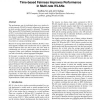Free Online Productivity Tools
i2Speak
i2Symbol
i2OCR
iTex2Img
iWeb2Print
iWeb2Shot
i2Type
iPdf2Split
iPdf2Merge
i2Bopomofo
i2Arabic
i2Style
i2Image
i2PDF
iLatex2Rtf
Sci2ools
138
click to vote
USENIX
2004
2004
Time-based Fairness Improves Performance in Multi-Rate WLANs
The performance seen by individual clients on a wireless local area network (WLAN) is heavily influenced by the manner in which wireless channel capacity is allocated. The popular MAC protocol DCF (Distributed Coordination Function) used in 802.11 networks provides equal long-term transmission opportunities to competing nodes when all nodes experience similar channel conditions. When similar-sized packets are also used, DCF leads to equal achieved throughputs (throughputbased fairness) among contending nodes. Because of varying indoor channel conditions, the 802.11 standard supports multiple data transmission rates to exploit the trade-off between data rate and bit error rate. This leads to considerable rate diversity, particularly when the network is congested. Under such conditions, throughput-based fairness can lead to drastically reduced aggregate throughput. In this paper, we argue the advantages of time-based fairness, in which each competing node receives an equal share of the ...
Related Content
| Added | 31 Oct 2010 |
| Updated | 31 Oct 2010 |
| Type | Conference |
| Year | 2004 |
| Where | USENIX |
| Authors | Godfrey Tan, John V. Guttag |
Comments (0)

